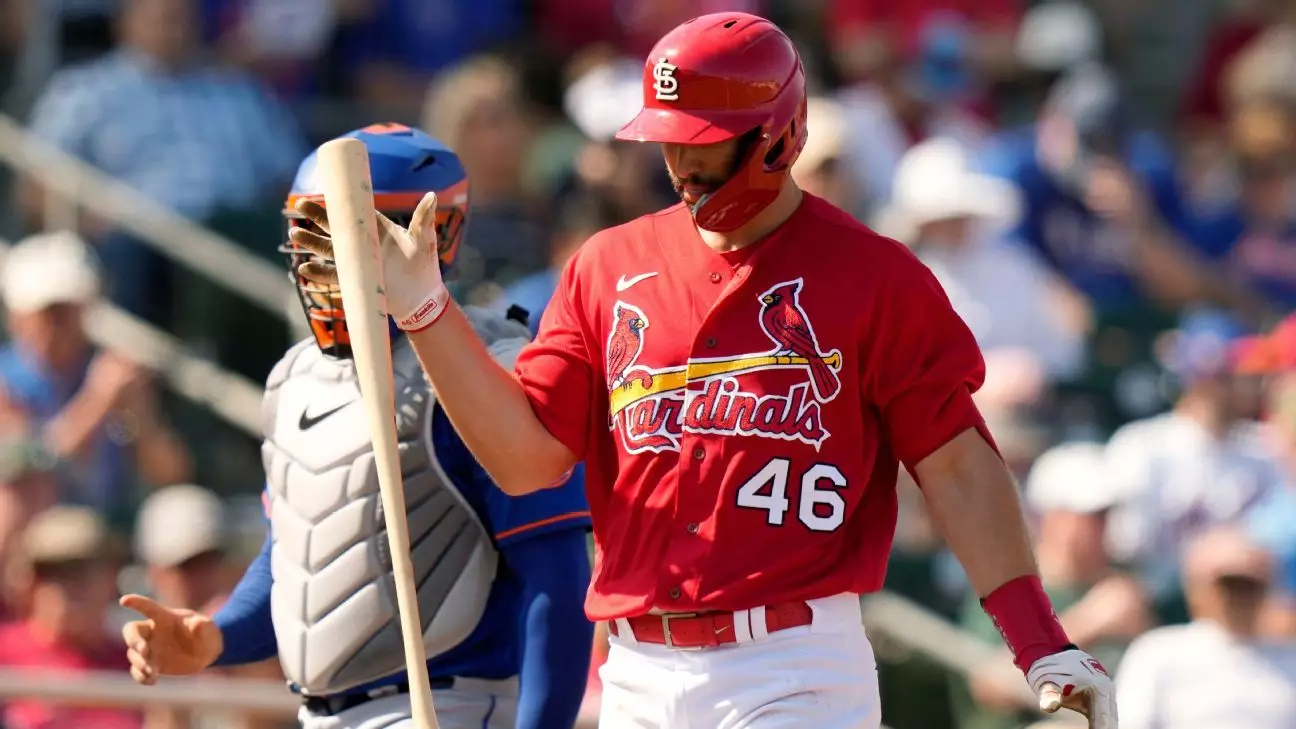Paul Goldschmidt’s journey over the last season can best be described as a rollercoaster, marked by both intense challenges and moments of clarity. The former National League MVP faced a grim start, enduring a staggering 0-for-32 slump that left fans and analysts alike questioning his abilities. Such a dramatic drop in performance can easily lead to self-doubt for any athlete, and Goldschmidt was no exception. His remarks, “the feeling was just like, ‘Man, I’m better than this,’” encapsulate the frustration that comes when personal expectations clash with reality. This experience serves as a reminder of the pressure athletes face, not only to perform but to navigate the significant emotional highs and lows that come with professional sports.
This offseason, Goldschmidt made headlines by signing a one-year contract with the New York Yankees valued at $12.5 million. The Yankees, who fell short in the World Series against the Los Angeles Dodgers, are looking to reshape their lineup. After losing out on Juan Soto to their crosstown rivals, they saw Goldschmidt as a viable alternative to bolster their offensive power. The infusion of talent is exciting for Yankees fans, especially as Goldschmidt collides with other prominent names like Aaron Judge and Giancarlo Stanton, creating a formidable lineup that has the potential to dominate.
At 37 years old, Goldschmidt brings invaluable experience to a team aiming for championship success. Despite his recent struggles, the accolades he has accumulated—seven-time All-Star and four-time Gold Glove winner—speak to a career that has been largely successful. As he steps into Yankee Stadium, he recalls the electrifying atmosphere of playing there: “Just to feel the energy walking out of the dugout, that was really fun,” he remarked, highlighting the motivation he draws from the supportive crowd. Such sentiments affirm the idea that the right environment can rejuvenate a player’s passion.
Goldschmidt’s recent performance dips underscore a broader narrative of adaptation and resilience. With a career-low .245 batting average reflecting an unsettling experience at the plate, he recognized the need for introspection. “Some things that I did wrong that got exposed,” he noted. This honesty illustrates a willingness to reassess one’s approach—a critical trait for any athlete looking to reclaim past glory. His late-season resurgence, where he hit .283 with seven home runs, indicates that Goldschmidt applied these lessons effectively.
However, his path to redemption was not linear. He sought improvement and refinement through various methods, including a two-day stint with Driveline Baseball, focusing on mechanical analysis. Yet even with this dedication, spring training proved challenging. Hitting just 6-for-47 (.128) demonstrated that the road to recovery could be fraught with difficulties. He candidly admitted that misalignments in his swing mechanics were symptomatic of larger mental challenges, revealing the complex interplay between physical performance and psychological readiness.
As Goldschmidt gears up for the 2024 season, he is not shying away from the challenges ahead. The collaborative spirit with teammates like Judge signifies his commitment to continuous improvement. “I’ve always tried to do is find great hitters… and just try to learn from them,” he articulated, emphasizing the importance of mentorship in professional athletics. This philosophy of learning and adaptation is crucial as he steps into a new role within the Yankees’ organization.
The New York Yankees are not just gaining a player but also a seasoned competitor who understands the nuances of the game. As Goldschmidt aims to transition into his new environment, the spotlight will be on him to deliver results while demonstrating the resilience that has characterized his career. In a city where expectations and pressure run high, Goldschmidt’s potential to overcome his previous struggles may not only define his fate but could also shape the Yankees’ journey in the coming season. His story serves as a reminder that in sports, as in life, the ability to rise from adversity can be the catalyst for greatness.

